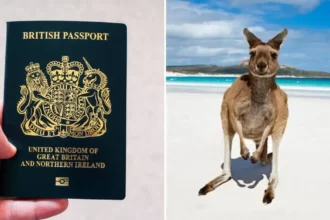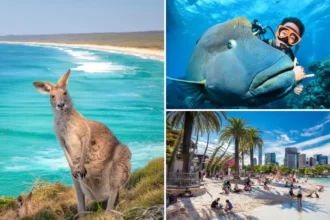In an era where the rigidity of a nine-to-five job is becoming increasingly constrictive, a new trend is emerging among Generation Z. Fuelled by the pressures of a relentless corporate world and the transformative events of the pandemic, many are now choosing to invest their savings not in bricks and mortar, but in experiences, embarking on what’s being termed the ‘quarter-life gap year’.
At the heart of this shift is the story of Chiara Powell, a 26-year-old professional from Brighton. Her journey from the high-pressure environment of banking and consulting to a life of travel and exploration is reflective of a broader sentiment.
Despite no explicit expectation to work excessively, Powell found herself trapped in a cycle of self-imposed pressure, leading to a significant work-life imbalance.
This realisation spurred her and her boyfriend, who shared her discontent with the routine grind, to embark on a transformative journey with £10,000 in savings, symbolising the beginning of their quarter-life gap year.
Digital nomadism: A window to the world
Powell’s transition from a stressed corporate worker to a flourishing digital nomad in Southeast Asia exemplifies a lifestyle increasingly coveted by her generation.
As a social media strategist, she chronicles her travels through lush landscapes and vibrant cultures, engaging a growing audience of young professionals contemplating a similar escape from the corporate world.

The surge of mid-twenties explorers
Tour operators are witnessing a remarkable surge in travel interest among 18 to 30-year-olds. Companies like Intrepid Travel report significant upticks in bookings from this age group.
This trend, partly fuelled by the ‘pandemic skip’ – a term coined to describe the years of formative experiences lost to lockdowns – reflects a keen desire among young adults to make up for lost time and explore uncharted territories.
They’ve spent most of their twenties working and at home not being able to travel during the pandemic, some missing out on a gap year after finishing studies. Now is the time for them to visit the destinations they’ve been dreaming about.
Hazel McGuire, Intrepid Travel’s UK & Ireland General Manager
The housing dilemma: A push towards exploration
The current housing crisis, with skyrocketing prices making homeownership a distant dream for many, has also contributed to this shift in priorities. Young adults, disillusioned by the daunting prospect of property investment, are increasingly finding solace and excitement in the idea of travel.
It’s not just a holiday; it’s an investment in experiences, seen as more attainable and immediately gratifying than the elusive goal of buying a house.
Redefining the ‘quarter-life crisis’
This newfound enthusiasm for travel and exploration among young adults is often humorously referred to as a ‘quarter-life crisis’. However, unlike its mid-life counterpart, this phase is viewed positively, as a period of self-discovery, growth, and a welcome break from societal expectations.
It’s a time for reassessing life goals and priorities, often leading to significant personal and professional transformations.
Beyond the gap year: Long-term impact on careers
The implications of the quarter-life gap year extend beyond mere travel. For many, like Powell, it serves as a catalyst for a complete career overhaul. The experiences and insights gained during these travels are leading to new entrepreneurial ventures and alternative career paths.
Others view this period as a strategic pause, a time to recharge and return to their professional lives with a refreshed mindset and renewed enthusiasm.
Challenging conventions: The new era of young adulthood
This shift towards embracing the quarter-life gap year challenges traditional notions of career progression and life planning. It underscores a growing recognition among Generation Z that there are diverse pathways to personal and professional fulfilment.
The concept of taking a significant break in one’s twenties, once considered unconventional, is now gaining acceptance as a legitimate and valuable life choice.
Conclusion
In wrapping up these tales of modern adventurers like Chiara, we’re reminded of the transformative power of taking a gap year. Their stories, set against the vibrant backdrops of Southeast Asia, are not just about travel, but about redefining life’s journey.
They show us that stepping off the beaten path, whether it’s exploring the ancient temples of Cambodia or surfing on the shores of Bali, can be a gateway to self-discovery and new beginnings. These narratives inspire us to think differently about our own paths, proving that sometimes, the best way to find ourselves is to venture out into the world, with all its wonders waiting to be explored.





